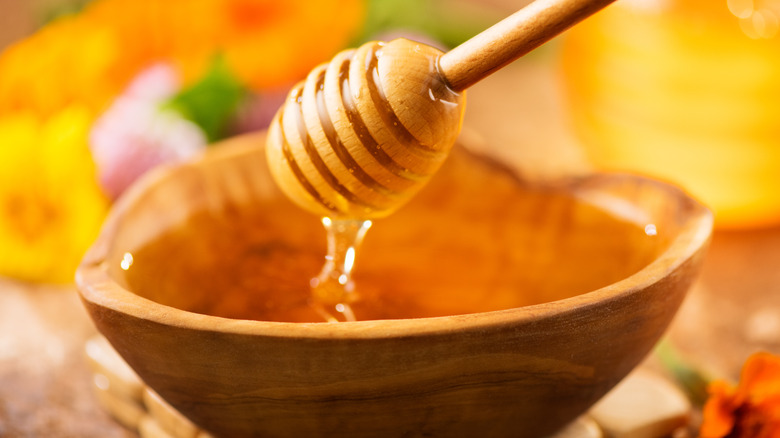Is TikTok's Frozen Honey Popsicle Actually Good For You?
Summer is here and you may be craving a refreshing cold treat, such as popsicles or ice cream, to cool down — but what about the #Frozenhoneychallenge? This viral TikTok health trend is sweeping the internet, despite experts advising against it (via Independent). The premise is simple: put honey in a water bottle, and then let it freeze overnight for a cold taffy-like treat. Is sucking on these gelatinous popsicles actually good for your body?
According to the Cleveland Clinic, honey in moderation is a great addition to a healthy diet. It has many health benefits, as it contains minerals, enzymes, and antioxidants. The antioxidants specifically help protect the body from free radicals. One 2017 review published in Pharmacognosy Research found the antioxidant effect of raw honey, in particular, to be so strong that it can protect various systems in the body. This includes the cardiovascular, gastrointestinal, respiratory, and nervous systems.
"If you grab a couple [of] tablespoons of frozen honey after an intense workout, it can be helpful for refueling your muscle glycogen," registered dietitian nutritionist Jackie Newgent tells Everyday Health. Thanks to the carbohydrate content (it's high in sugar, too), frozen honey popsicles may help with muscle recovery post-workout since carbohydrates are a key component of refueling (per Everyday Health).
What are the downfalls of the frozen honey challenge?
That being said, there are some serious health consequences associated with the #Frozenhoney trend on TikTok. One sweet serving of honey equates to about 64 calories per tablespoon (via MedicalNewsToday). However, this viral TikTok trend doesn't always follow the recommended amount.
Consuming large blobs of frozen honey is likely to wreak havoc on your gastrointestinal system and cause serious digestive issues (per the Cleveland Clinic). "Due to its fructose content, if you get carried away and consume even just one-fourth of a typical water bottle's worth of frozen honey, you may experience bloating, stomach cramping, or diarrhea," Newgent explains to Everyday Health. This can be exacerbated if you have a fructose intolerance that you're unaware of, gastroenterologist Dr. Alberto Rubio-Tapia points out to the Cleveland Clinic.
According to the U.S. Department of Agriculture (USDA), honey contains 17 grams of sugar. That's already over half the daily recommended amount of sugar for women (25 grams) and men (36 grams), explains the American Heart Association. Eating large quantities of frozen honey popsicles surpasses the daily sugar allotment, and it can spike blood levels while simultaneously lowering blood pressure, according to the Cleveland Clinic. If you're on the fence about whether you should try the trend, maybe limit yourself to a frozen spoonful instead.


